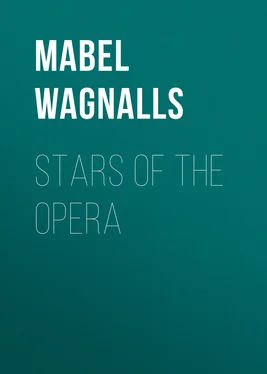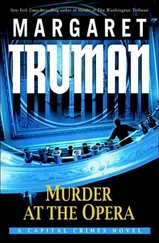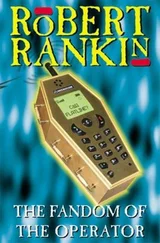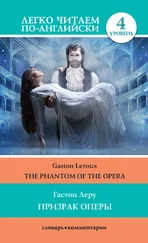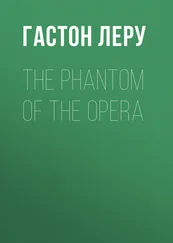Mabel Wagnalls - Stars of the Opera
Здесь есть возможность читать онлайн «Mabel Wagnalls - Stars of the Opera» — ознакомительный отрывок электронной книги совершенно бесплатно, а после прочтения отрывка купить полную версию. В некоторых случаях можно слушать аудио, скачать через торрент в формате fb2 и присутствует краткое содержание. Жанр: foreign_antique, foreign_home, music_dancing, на английском языке. Описание произведения, (предисловие) а так же отзывы посетителей доступны на портале библиотеки ЛибКат.
- Название:Stars of the Opera
- Автор:
- Жанр:
- Год:неизвестен
- ISBN:нет данных
- Рейтинг книги:5 / 5. Голосов: 1
-
Избранное:Добавить в избранное
- Отзывы:
-
Ваша оценка:
- 100
- 1
- 2
- 3
- 4
- 5
Stars of the Opera: краткое содержание, описание и аннотация
Предлагаем к чтению аннотацию, описание, краткое содержание или предисловие (зависит от того, что написал сам автор книги «Stars of the Opera»). Если вы не нашли необходимую информацию о книге — напишите в комментариях, мы постараемся отыскать её.
Stars of the Opera — читать онлайн ознакомительный отрывок
Ниже представлен текст книги, разбитый по страницам. Система сохранения места последней прочитанной страницы, позволяет с удобством читать онлайн бесплатно книгу «Stars of the Opera», без необходимости каждый раз заново искать на чём Вы остановились. Поставьте закладку, и сможете в любой момент перейти на страницу, на которой закончили чтение.
Интервал:
Закладка:
On seeing Marguerite, Faust addresses her as "My charming lady," and begs permission to walk home with her. To which Marguerite very properly replies that she is neither "charming" nor a "lady," and can go home "alone." The question and response last only a moment, but the two themes are most exquisitely adapted to the words, and should be noted, as they recur later on in the opera. Especially lovely are these first notes of the soprano; and after so much chorus and bass and orchestra, they soar out like strokes from a silver bell.
Marguerite goes on her homeward way, and leaves Faust more in love than before. Mephisto rejoices, and the waltz is resumed. Thus ends Act II.
And now for the Garden Scene—a veritable bouquet of melodies, flowers that never fade! The first aria is, indeed, called the "Flower Song," but only because Siebel sings to the flowers he has brought for Marguerite. Siebel is the contralto rôle, and therefore always taken by a woman. It is a very short part, but as two of the sweetest songs in the opera belong to Siebel, great artists are glad to take the character. The short prelude by the orchestra before the "Flower Song" is as artistic as any other part. It seems to smooth the brow and quiet the mind, and coax the hearer into just the right mood "to be lulled by sounds of sweetest melody." Siebel's song is indeed "sweetest melody"—so much so that a poor singer can hardly spoil it. That gentle and caressing theme captures the heart every time.
After Siebel has gone, there enter Faust and Mephistopheles (who gains admission everywhere). The latter is in high spirits, and Faust is in love. They look upon the garden with different emotions. Faust rhapsodizes and is lost in romance; but Mephisto's more practical vision perceives the flowers which Siebel has left at Marguerite's door. He goes off at once to procure a present that shall outshine these. During his absence Faust sings the "Salve Dimore." These are the first words of the song, which mean "Hail! dwelling pure and simple;" but this composition is always given its Italian name. It is interesting to note the names by which celebrated arias are known. Some are designated by the subject, as the "Jewel Song," "Flower Song." Then, again, some are known by the rhythm, as the "Waltz Song" from "Romeo and Juliet," or the "Polacca from 'Mignon.'" Then, there are others whose names only indicate the number of voices, as the "Sextet from 'Lucia,'" the "Quartet from 'Rigoletto';" while many are spoken of by their Italian names. The "Salve Dimore" belongs to this class, and, like the "Jewel Song," is so celebrated that many people who have not heard the music are still familiar with the name. The tenor who does not receive abundant applause after this aria may feel that he has lost his best chance in the opera.
After the solo Mephisto reenters with a jewel-casket under his arm. He places this where Marguerite will surely find it, and then the two retire. Now is an expectant moment, for the soprano holds the stage alone for some time, and has in this scene her finest solos. She comes in through the garden gate and walks very slowly, for she is thinking about the handsome stranger who spoke to her in the street. She tries, however, to forget the occurrence, and resolutely sits down to her spinning. As she spins she sings a ballad called "The King of Thule." It is a sad little song, with strange minor intervals that make one feel "teary 'round the heart." Marguerite interrupts her ballad to soliloquize again, in pretty recitative tones, about that "fine stranger," but she soon recalls herself and resumes the song. At last she gives up trying to spin, and starts for the house; whereupon she sees Siebel's flowers, which are admired, but dropped in amazement when her eyes rest upon the jewel-box. After some misgivings she opens it and discovers jewels so beautiful that from sheer joy and delight she starts to trilling like a bird. This trill is the opening of the great aria, which seems to thus poise for a moment and then fly away in the ascending scale which commences the brilliant theme. The "Jewel Song" is as difficult as it is beautiful, and the artist who renders it well deserves unstinted praise.
Before the song is ended, Martha, the matron in whose care Marguerite has been entrusted, comes into the garden, and soon is followed by Faust and Mephistopheles. Hers is a necessary but unimportant character, as she has no solo and is merely a foil for Mephistopheles. She is represented as a very susceptible widow, and he takes upon himself the uninviting task of making love to her in order that Faust and Marguerite may have a chance. The two couples walk back and forth in the garden, which is supposed to extend beyond the limits of the stage. The courting as done by Mephistopheles is highly absurd, and is, in fact, the only touch of humor in the opera.
But very different are the scenes between Faust and Marguerite. Every phrase is full of charming sincerity. But it is after the quartet, after the second exit and reappearance, that we hear their great love duet. The evening shadows have lengthened, and "Tardi si fa" ("It groweth late") are the first words of this superb composition, which is indeed like pure gold. It stands alone in musical literature as the ideal love music. The only work that is ever compared to it is Wagner's duet in the "Walküre." Some writer has ventured the statement that in this "Faust" duo Gounod has "actually discovered the intervals of the scale which express the love passion." The idea is not a wild one nor a new one, for it is known that the Greeks held a similar belief, and even prohibited certain harmonies and intervals as being too sensuous. Be that as it may, there is a subtle charm about Gounod's music that eludes description. When we hear that final ecstatic leap from C sharp to high A, a mystic hush and spell steals over us.
There is little more after the duo. Marguerite rushes into the house, and Faust is aroused by the unwelcome voice of Mephistopheles. The latter's jesting tone is most irritating to the lover. But this dialog is soon interrupted by one of the loveliest scenes in the opera. Marguerite throws open the blinds of her window and looks into the garden, which she believes is now vacant. The moonlight falls upon her, and she suddenly begins singing. It is a burst of melody as spontaneous and free as the song of a nightingale. The song is not long, and soon the curtain descends; but the picture leaves a lasting impression.
Act IV. comprises three scenes. The first one is short, and depicts Marguerite's grief and remorse. Faust has forsaken her, and the faithful Siebel tries to comfort and console. This second solo of Siebel's is a melody of noble simplicity. The beautiful cadence given to the twice-repeated name, "Marguerita," reveals a heart full of unselfish love.
The next scene represents a street in front of Marguerite's house. There is general excitement and anticipation among the villagers, for to-day the soldiers return from war. They presently enter, amid much rejoicing, and sing their great chorus, called the "Faust March." This march is so popular and well known that people who believe they have never heard a note of the opera will be surprised to find that they recognize this march. It is played by every military band in the country. After the chorus the soldiers disperse to their homes and friends. Valentine is greeted by Siebel, but the brother inquires about his sister, and hastens into the house.
The stage now is darkened, for the hour is late. Presently Faust and Mephisto appear. The latter has brought his guitar, and he assumes the privilege of singing a serenade to Marguerite, while Faust stands to one side in melancholy meditation. Mephisto's song is more insulting than complimentary. As a musical expression of irony, sarcasm, and insolence, this composition is certainly a success. The last three notes of the first phrase are a veritable leer. This is the second important bass solo, and, when well given, is highly effective, as it admits of great variety of expression. But instead of bringing forth the object of the serenade, Marguerite's brother appears at the door, and with drawn sword. He seeks out Faust and challenges him to a duel. The challenge is accepted, and they are soon fighting; but the result is inevitable, for Mephisto uses his demoniac power to protect Faust, and so Valentine is wounded. The noise of the scuffle has aroused the villagers, who hurry in with lanterns and find Valentine dying. Marguerite rushes forward and falls on her knees beside him, but Valentine motions her away. He rises up in his death agony and curses her in tones that are like balls of fire. The villagers look on with awe, while poor Marguerite is stunned by these terrible words from her dying brother. It is the most tragic moment of the opera. When Valentine expires, every one kneels as they sing a solemn prayer, and the curtain falls.
Читать дальшеИнтервал:
Закладка:
Похожие книги на «Stars of the Opera»
Представляем Вашему вниманию похожие книги на «Stars of the Opera» списком для выбора. Мы отобрали схожую по названию и смыслу литературу в надежде предоставить читателям больше вариантов отыскать новые, интересные, ещё непрочитанные произведения.
Обсуждение, отзывы о книге «Stars of the Opera» и просто собственные мнения читателей. Оставьте ваши комментарии, напишите, что Вы думаете о произведении, его смысле или главных героях. Укажите что конкретно понравилось, а что нет, и почему Вы так считаете.
